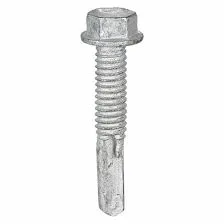self tapping wafer screws
Understanding Self-Tapping Wafer Screws
Self-tapping wafer screws are a popular choice in various applications due to their unique design and functionality. These screws are engineered to create their own mating thread in the material they are driven into, effectively eliminating the need for pre-drilling. This feature makes them especially useful in scenarios where efficiency and speed are paramount.
Design and Construction
Self-tapping wafer screws are identifiable by their flat, wide heads resembling a washer, which allows for a larger surface area that helps distribute the load and prevents the screw from pulling through softer materials. The screws typically have a sharp tip that facilitates entry into materials without requiring a pilot hole. Their threads tend to be coarse and deep, enabling them to engage securely with the base material.
The materials used for manufacturing wafer screws often include stainless steel, carbon steel, and various coatings such as zinc plating. These materials enhance the screws' durability and resistance to environmental factors, making them suitable for both indoor and outdoor applications. The choice of material and coating is crucial in determining the screw's resistance to rust, corrosion, and wear.
Applications
Self-tapping wafer screws find application in a wide array of industries, including construction, automotive, electronics, and manufacturing. They are particularly effective in the assembly of metal-to-metal and metal-to-plastic joints. In the construction industry, for example, these screws are used extensively in securing roof panels, siding, and other structural components.
self tapping wafer screws

In the automotive sector, self-tapping wafer screws are utilized in various assemblies where mechanical fasteners are required. Their ability to create threads in thin materials without compromising structural integrity makes them invaluable in vehicle manufacturing. Likewise, in the electronics field, these screws can be found securing casings and components, ensuring a tight fit that is crucial for device longevity.
Advantages
One of the primary advantages of self-tapping wafer screws is their efficiency. The ability to skip the pre-drilling stage reduces assembly time, making them ideal for high-volume production environments. This efficiency can lead to significant cost savings in both labor and time.
Moreover, their design minimizes the risk of stripping, as the screws engage with the material more efficiently than traditional screws. The large head design enhances torque distribution, reducing the likelihood of overtightening and ensuring a secure fit without damaging the material.
Self-tapping wafer screws are also versatile. They can be used in a variety of materials including wood, plastic, and metal, making them an excellent choice for diverse projects. Additionally, their availability in a range of sizes and specifications means that there is a suitable option for nearly every fastening need.
Conclusion
In conclusion, self-tapping wafer screws represent a significant innovation in fastener technology. Their design offers unique advantages that make them suitable for various applications across multiple industries. From improving construction efficiency to streamlining automotive manufacturing processes, these screws exemplify the marriage of practical engineering and functional design. As industries evolve and demand for more efficient assembly techniques increases, self-tapping wafer screws are likely to remain a key component in the toolkit of builders, manufacturers, and engineers alike. Whether one is engaged in DIY home projects or large-scale industrial manufacturing, understanding and utilizing these fasteners can greatly enhance the quality and speed of construction and assembly tasks.
-
Weatherproof Plastic Expansion Anchors for OutdoorBalitaJun.06,2025
-
Sustainability in the Supply Chain: Eco-Friendly TEK Screws ProductionBalitaJun.06,2025
-
Load-Bearing Capacity of External Insulation FixingsBalitaJun.06,2025
-
Double Head Bolts: Enhancing Efficiency in Industrial MachineryBalitaJun.06,2025
-
Corrosion Resistance in Chipboard Screws: Coatings for Wholesale DurabilityBalitaJun.06,2025
-
Butterfly Toggle Bolts : Enhancing Structural ResilienceBalitaJun.06,2025
